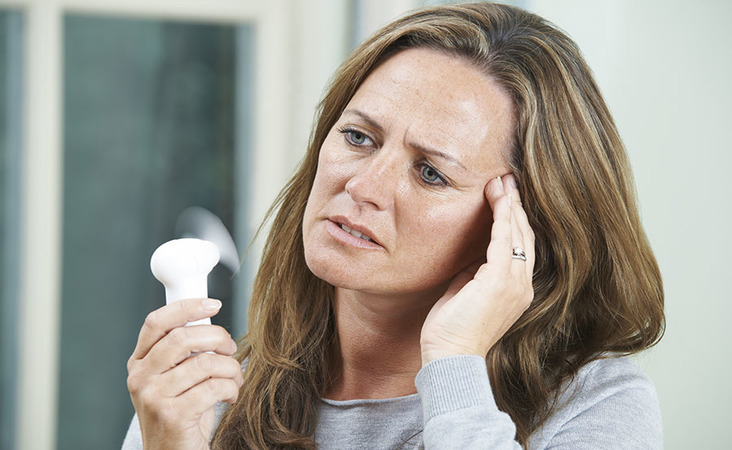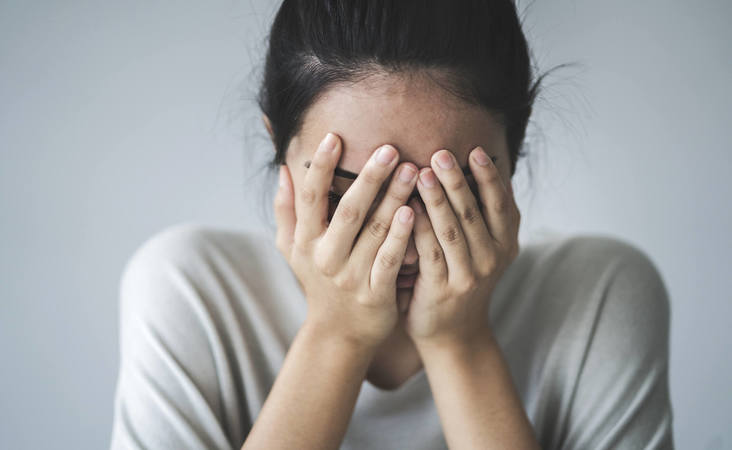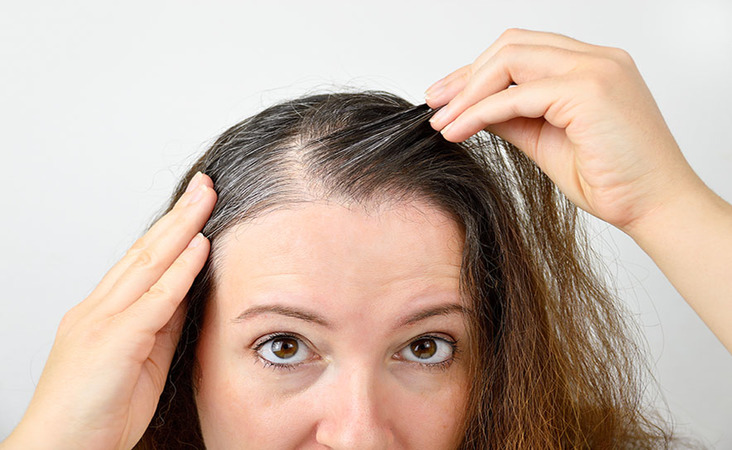Menopause, Hair Loss, and Hair Recovery: Everything You Need to Know
- Written by Lordhair Team
- Jan 8, 2021
- |
- 5 min read
 Listen to the full text
Listen to the full textMenopause brings along many health conditions but hair loss is certainly one of the most stressful ones. For some women, it occurs during menopause while for others, it happens afterward.
A lot of women have no idea that menopause triggers hair loss and are often taken by surprise when it happens. This is the reason why a lot of them fail to take the right steps and some have to wear wigs for women to cover their thinning hair.
To help women recover from menopause-related hair fall, Lordhair decided to come up with this blog. We will touch upon everything you need to know about menopause and hair loss. Let’s start with the meaning of menopause first.
What is menopause?
Menopause is a natural biological process that all women experience at some point in their lives. This condition usually appears in women in their late 30s, 40s, or 50s. Menopausal transition usually lasts about 7 years but in some rare cases can last as long as 14 years.
During menopause, the body goes through numerous physical changes as it adjusts to fluctuating hormone levels. Bones become less dense, making women more vulnerable to fractures. They also begin to face excessive hair loss, changes in fat cells, and sudden weight gain.

Why does menopause affect hair?
Sudden changes in hormones account for hair loss during menopause. Hair loss during or after menopause is the result of lowered production of oestrogen and progesterone. For those who don’t know the duo, they support the growth of hair strands and keep them on the head for long periods of time.
When the levels of oestrogen and progesterone drop, the growth cycle of hair strands shortens and they become thinner as well as weaker. A decrease in these two hormones also boosts the production of androgens in women which impacts the health of scalp hair and the volume of hair strands. Strands that grow to replace the lost ones also emerge thinner and weaker. In rare cases, this could also result in permanent hair loss among women.
Other causes of menopause
Apart from sudden changes in hormones, there are other causes that trigger hair loss during or after menopause among women. The followings are some of those factors:
#1 High levels of stress
Most women experience high levels of stress during menopause. In addition to changes in hormones, demands of teenage children, aging parents, and career challenges add to the level of stress among females.
Stress pushes a large number of hair follicles into the resting phase, stopping the hair from growing and pushing them towards a dormant stage. Taking too much stress during menopause could also affect the immune system and make the hair prone to infections.

#2 Chemotherapy and radiation therapy
Yes, you read that right! Chemotherapy and radiation therapy also cause menopausal hair loss in women. Chemotherapy drugs are powerful medications that are programmed to attack cancer cells in the body. Unfortunately, these drugs also cause irregular menstrual cycles or amenorrhea and attack hair follicles, which trigger menopause hair loss.
On the other hand, radiation therapy affects ovarian function if radiation is directed at the ovaries. It causes hormonal imbalance, which in turn could start menopausal hair loss among women.
#3 Vitamin and mineral deficiency
Menopause is really exhausting for the body and often causes vitamin as well as mineral deficiencies. It commonly causes deficiencies of calcium and magnesium in women which result in muscle cramps, stress, and anxiety.
Menopause also strips Vitamin D from the body and the same contributes to fatigue, joint pains, low immune function, and hair loss.
10 essential vitamins and nutrients that promote hair growth among women.
Symptoms of menopause
Menopause is officially diagnosed in women after they have not encountered a menstrual period for more than one year. Other than excessive hair loss, females experience many other symptoms during menopause. Here are some of them:
- Irregular periods
- Vaginal dryness
- Hot flashes
- Chills
- Night sweats
- Sleep problems
- Mood swings
- Weight gain and slowed metabolism
- Thinning hair and dry skin
- Loss of breast fullness
Lordhair recommends speaking to your doctor if you have been missing periods for some months.
Now that you know the different symptoms of menopause, it's time to discuss the treatments for women experiencing menopausal hair loss.

Treatments for menopause hair loss
Hair loss during or after menopause makes most women feel self-conscious about their physical appearance. The good news is that there are very few chances of permanent hair loss. With the right treatments and lifestyle changes, improving the quality of hair during and after menopause is very much possible.
We have prepared a list of treatments and lifestyle changes to overcome menopausal hair loss. The followings are treatments to keep your locks healthy:
#1 Reduce stress
First thing first, women going through the menopause phase need to keep their stress levels in check. Reduced estrogen production during or after menopause can cause mood swings and anxiety, which is the reason behind aggressive hair loss.
Perform yoga, breathwork, and other relaxation techniques to decrease everyday stress. Go for a walk, hike, or engage in any other physical activities that help you relax. Light exercise is also a great way to reduce stress and supports recovery from menopausal hair loss.
#2 Eat well
As we said, menopause depletes vitamins and nutrients from our body. Therefore, we must eat a balanced and low-fat diet. Include an adequate amount of whole grains, fruits, and vegetables in every meal. Incorporate mono-saturated oils such as olive oil or sesame oil into your diet plan as well.
Green tea and vitamin supplements could also help women in restoring hair growth to some extent. Essential fatty acids play an important role in maintaining hair health during or after menopause. Therefore, try to consume foods rich in fatty acids such as salmon, tuna, flaxseed oil, walnuts, and almonds.

#3 Avoid heat
Since hair strands get weak during menopause, it's best to stay away from heat-based styling tools such as hair dryer and straightening iron. Want to dye your hair during menopause? Go for an all-natural hair color since chemicals found in some dyes and perms could compromise the scalp and hair health.
While washing hair, use a nourishing conditioner to keep the scalp healthy and promote hair growth during menopause. It's highly recommended to take a prescription from a dermatologist to select the right shampoo.
#4 Go for hair wigs
As a popular way to recover from hair thinning in women, modern wig is durable, breathable, and carries a skin-friendly base. Millions of women across the globe wear full cap wigs to get back a full head of hair in their late 40s and 50s.
Advantages of hair wigs
Whilst there are many advantages of using a modern hair wig for women, below are the major ones:
Quick result: Unlike most solutions to fix menopausal hair loss, hair patches guarantee a quick change in look. There is no waiting time with this hair recovery option. All you need to do is to purchase a hairpiece (another term for hair wig), put it on your head, and you are good to go!
Low price: Hair wigs are an affordable hair recovery solution to women suffering from menopausal hair loss. By spending less than US$400, you can enjoy a full head of hair for a few months!
Check out this transformation to witness how a hair wig helps overcome temporary as well as permanent hair loss!
#5 Minoxidil
Women during or after menopause also use topical solutions like Minoxidil if hair loss is just starting. Also called Rogaine, it helps in regaining hair strands that women lose during menopause. Minoxidil comes in two different solutions - 2% and 5%. Dermatologist advises women to use a 2% solution of Rogaine.
While Minoxidil is widely popular, it does have its share of side effects. Here are the documented side effects of Rogaine in women:
- Acne at the site of application
- Burning of scalp
- Inflammation or soreness at the root of the hair
- Redness
- Swelling of face
- Chest pain
- Dizziness
- Fast or irregular heartbeat
- Flushing
- Headache
Read about the side effects of minoxidil in details before using the medication.
Recover from hair loss with Lordhair
Hair loss caused during or after menopause is upsetting to most women since hair is intrinsically linked to their self-esteem and personality. We hope our recommended menopausal hair loss treatments will help you pick the right recovery plan!
We highly recommend using a hair wig if your hair loss during menopause is getting worse. It's a cost-effective, risk-free, and practical solution to hair loss during and after menopause. We strongly advise consulting your trichologist before using any medication-based treatments to stop menopausal hair loss.
Got any queries to ask? Send them at support@lordhair.com and have them answered by our hair experts!


